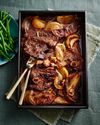
We must be doing something right when it comes to living younger longer. The statistics are dramatic when you compare today’s chances of dying to 50 years ago. If you’re 50 years old today, your chances of dying at that age are the equivalent of someone in their late thirties 50 years ago. If you’re 80 today, your chances of dying at that age are the equivalent of someone in their late sixties 50 years ago. If you’re 90 years of age today, your chances of dying at that age are the equivalent of someone in their early eighties 50 years ago. Put another way, in 1950, the risk of death in the following 12 months for an 85- year-old woman in Sweden was 17 per cent. Today it’s 7 per cent. The size of reductions have been similar for men and even people aged over 90. In the US, at age 95, the risk of dying has fallen from 31 per cent to 22 per cent. So why has this happened? There are many reasons, including stopping smoking, but it’s far more than that.
There are a few concepts about living younger longer that are important to get straight up front. The first is to be clear that the aim is to have a body (including your brain) that has fewer kilometres on the clock than your number of birthdays would suggest. In other words, your biological age is less than your years. There are many markers of being biologically older than your calendar age. High blood pressure, high blood sugars and fats, too big a waist circumference, resting pulse rate, exercise tolerance, muscle strength, cognitive impairment and levels of chronic stress and psychological distress are all markers of increased biological age. There are also markers than can be measured in our genes and chromosomes.
This story is from the {{IssueName}} edition of {{MagazineName}}.
Start your 7-day Magzter GOLD free trial to access thousands of curated premium stories, and 9,000+ magazines and newspapers.
Already a subscriber ? Sign In
This story is from the {{IssueName}} edition of {{MagazineName}}.
Start your 7-day Magzter GOLD free trial to access thousands of curated premium stories, and 9,000+ magazines and newspapers.
Already a subscriber? Sign In

Hitting a nerve
Regulating the vagus nerve with its links to depression, anxiety, arthritis and diabetes - could aid physical and mental wellbeing.

Take me to the river
With a slew of new schedules and excursions to explore, the latest river cruises promise to give you experiences and sights you won’t see on the ocean.

The last act
When family patriarch Tom Edwards passes away, his children must come together to build his coffin in four days, otherwise they will lose their inheritance. Can they put their sibling rivalry aside?

MEET RUSSIA'S BRAVEST WOMEN
When Alexei Navalny died in a brutal Arctic prison, Vladimir Putin thought he had triumphed over his most formidable opponent. Until three courageous women - Alexei's mother, wife and daughter - took up his fight for freedom.

The wines and lines mums
Once only associated with glamorous A-listers, cocaine is now prevalent with the soccer-mum set - as likely to be imbibed at a school fundraiser as a nightclub. The Weekly looks inside this illegal, addictive, rising trend.

Jenny Liddle-Bob.Lucy McDonald.Sasha Green - Why don't you know their names?
Indigenous women are being murdered at frightening rates, their deaths often left uninvestigated and widely unreported. Here The Weekly meets families who are battling grief and desperate for solutions.

Growing happiness
Through drought flood and heartbreak, Jenny Jennr's sunflowers bloom with hope, sunshine and joy

"Thank God we make each other laugh"
A shared sense of humour has seen Aussie comedy couple Harriet Dyer and Patrick Brammall conquer the world. But what does life look like when the cameras go down:

Winter baking with apples and pears
Celebrate the season of Australian apples and pears with these sweet bakes that will keep the midwinter blues away.

Budget dinner winners
Looking for some thrifty inspiration for weeknight dinners? Try our tasty line-up of low-cost recipes that are bound to please everyone at the table.